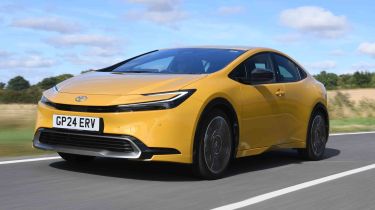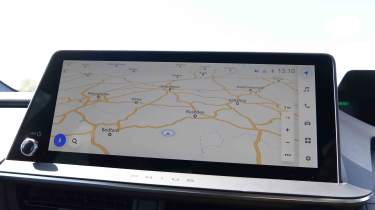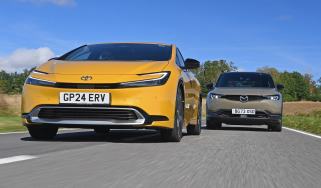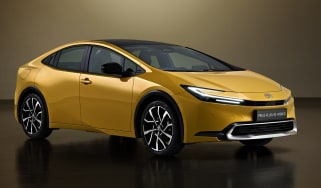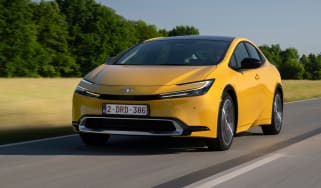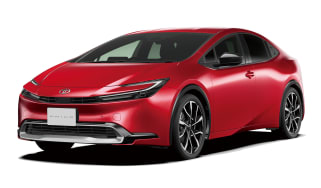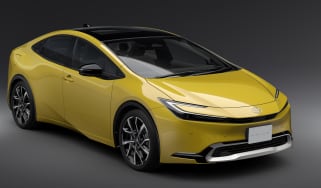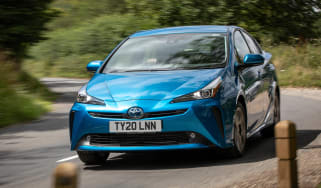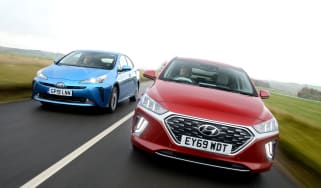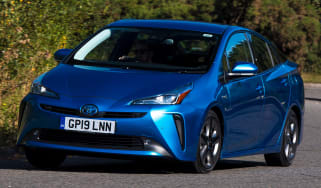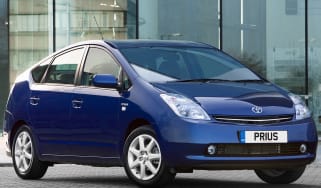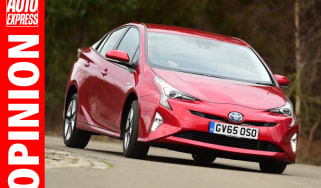Toyota Prius review
Sharp looks are matched by the best-ever driving experience to be found in a Prius

Is the Toyota Prius a good car?
Ever since the first Toyota Prius arrived in 1997, over five million examples have been sold, and at one point, it even became a Hollywood must-have as celebrities tried to boost their green credentials thanks to this car’s fuel efficiency.
After a brief period away from the UK order books, the fifth-generation Prius arrived in plug-in hybrid form, sporting sharper looks than any of its predecessors and giving this latest version real kerb appeal. Going plug-in hybrid means the Prius no longer steps on the toes of the hybrid Toyota Corolla and Toyota C-HR, both of which share the same TNGA platform as the Prius.
Apart from having to plug in to recharge the battery, the rest of the tech is familiar to other Toyota models: an efficient four-cylinder engine, an electric motor, and a hybrid system that provides all-electric driving when needed. The Prius is only available in two trim levels, Design and Excel, and both cost less than £40,000. That avoids the higher-rate luxury car tax, but means the Prius is significantly more than previous versions of Toyota’s economy car.
| Key specs | |
| Fuel type | Plug-in hybrid |
| Body style | Five-door hatchback |
| Powertrain | 2.0-litre four-cylinder petrol + electric motor |
| Safety | N/A |
| Warranty | 3yrs/60,000 miles (up to 10yrs/100k miles with routine franchised dealer servicing) |
How much does the Toyota Prius cost?
Since the Toyota Prius is now only sold in the UK as a plug-in hybrid, prices have seen a significant hike over past models. The entry-level model comes in at just under £37,500, which is £5,000 more than the price of the old Prius Plug-in that went off sale in 2023. That car was the priciest version of the old Prius, too, so the new model is a big step up from the old hybrid.
Used - available now

2020 Toyota
Prius
48,141 milesAutomaticPetrol1.8L
Cash £17,200
2020 Toyota
Prius
39,295 milesAutomaticPetrol1.8L
Cash £15,937
2020 Toyota
Prius
43,795 milesAutomaticPetrol1.8L
Cash £17,700
2020 Toyota
Prius
50,351 milesAutomaticPetrol1.8L
Cash £16,000There are two trim levels to choose from, and their Design and Excel names are familiar from elsewhere in Toyota’s line-up. The Excel commands a premium of more than £2,500 over Design, but at the moment, it narrowly slides under the £40,000 mark, avoiding the luxury car premium for road tax.
Both versions of the Prius Plug-in use the same powertrain, which comprises a 2.0-litre petrol engine and an electric motor that makes a combined 220bhp. The battery is a modest 13.6kWh in size, while Toyota’s CVT-style automatic gearbox handles power distribution between the engine, motor, battery and front wheels.
Engines, performance & drive
The sporty looks of the fifth-generation Toyota Prius are backed up by a chassis that lives up to those lines.
The latest Prius is almost as good to drive as it is to look at, and while it’s no sports car, as with other Toyotas developed off the TNGA platform, it does a fantastic job of balancing comfort and agility on all kinds of roads. You probably wouldn’t expect to hear that about a Prius, but it’s genuinely good fun to drive.
| Model | Power | 0-62mph | Top speed |
| Prius 2.0 VVTi | 220bhp | 6.8 seconds | 110mph |
What is the Toyota Prius like to drive?
In town
You can get more than 40 miles of real-world range from the electric motor and battery when fully charged and set to electric-only mode. That’s more than enough for most commutes and makes driving in town quiet and relaxing. Even when the engine kicks in, the switchover is super-smooth and so quiet you’ll hardly notice it. It’s only if you apply more throttle that you’ll hear the petrol engine. It’s not a great-sounding unit, but the noise it makes isn’t intrusive.
In 2017 we had a previous-generation Toyota Prius on our long-term test fleet. It ran on 15-inch wheels with huge tyres, and several members of staff described it as the most comfortable car on our fleet by quite a margin. This latest Prius uses the same platform as the older model, but the larger 19-inch alloys of Excel trim aren’t kind to the ride; it’s not as smooth as our old fleet car over bumps and potholes. If you want a comfier model, it might be better to stick to the lesser Design trim, which has 17-inch wheels.
On A- and B-roads
The sleek body and sharp roofline are matched by the driving position, which is surprisingly low but still comfortable. The steering wheel sits deep down, so the instruments can be slightly obscured by the rim. The steering is weighted nicely, but there’s no real feel or feedback from the road – that’s nothing new, though.
The Prius controls body movements well in corners, and the punchy powertrain means it’s genuinely enjoyable to drive on twisty roads, yet it remains comfortable and composed at all times. Forget any preconceptions you may have about the Prius, because keen drivers will be able to appreciate a lot about the quality of the new model’s handling.
On the motorway
There’s a bit of road noise from the eco tyres, but it blends well enough at motorway speeds into the general background hum that it doesn’t become overly intrusive. Wind noise is minimal thanks to the aerodynamic bodywork, but that does have one slight side-effect: the low windscreen and A-pillars mean visibility isn’t as good as we’d like.
0-62mph acceleration and top speed
There’s only one version of the Prius available in the UK right now, the plug-in hybrid. It pairs a 150bhp 2.0-litre petrol engine with a 161bhp electric motor; Toyota quotes a total output of 220bhp. That’s a pretty healthy figure, especially when compared with previous versions of the Prius that felt lethargic.
The Prius Plug-in accelerates from 0-62mph in just 6.8 seconds, which seems bizarrely quick for a car with a Prius badge, but we’re not complaining. The excellent performance comes as power from the electric motor blends seamlessly with that from the petrol engine.
The car uses a CVT gearbox, which is usually the enemy of driving fun. However, the software has come a long way, so in the latest Prius it feels pleasant to use rather than frustrating. It delivers power when you need it but doesn’t raise engine revs to a noisy drone like such technology did in older models. It feels a lot more natural as a result, but it still delivers decent efficiency and performance.
MPG, emissions & running costs
The Toyota Prius Plug-in’s economy stats are impressive. Even so, you’re unlikely to get close to the headline 564.9mpg, but you should still manage to achieve better fuel economy figures than you could in a traditional petrol or diesel car – we saw more than 80mpg even when the car’s battery was depleted.
That’s better than any other PHEV we’ve tried with a flat power pack, and demonstrates Toyota’s know-how when it comes to producing an efficient hybrid powertrain. Charge every day and use electricity for your commute, and you should see a higher figure. There’s even a ‘Predictive Efficient Drive’ system that learns your route to work and optimises the powertrain for the best fuel economy.
A regenerative braking system helps to put electricity back into the battery when you’re away from a plug socket and comprises three modes – gentle, medium and strong. It doesn’t quite allow for one-pedal driving, up to 80 per cent deceleration is served up in the ‘strong’ mode.
| Model | MPG | CO2 | Insurance group |
| Prius Plug-in Design | 565.0mpg | 12g/km | 31 |
| Prius Plug-in Excel | 403.5mpg | 17g/km | 31 |
Electric range, battery life and charge time
Despite a small battery of only 13.6kWh capacity, impressive aerodynamic efficiency allows for a fairly good electric range of over 50 miles. If you need a PHEV with even greater electric range, then you’ll need to look at the Skoda Superb iV or Volkswagen Passat, because they both have a larger 25.7kWh (19.7kWh useable) battery pack with enough charge for over 70 miles of EV range.
It takes about four hours to top up the battery on a home charger, because the on-board 3.5kW charger isn’t fast – but for overnight plug-ins, that doesn’t matter a huge amount.
| Model | Battery size | Range | Insurance group |
| Toyota Prius PHEV Design | 13.6kWh | 53.4 miles | 31 |
Tax
Company car tax bills are inexpensive, thanks to low CO2 emissions of 17g/km and plug-in hybrid status. Standard-rate taxpayers will fork out £638 to tax the Prius as a company car in the 2024/25 tax year – a couple of hundred pounds more than a similarly priced EV, but less than equivalent petrol models – while VED is £180 with both versions skirting under the £40,000 mark to avoid the expensive-car supplement.
Insurance
The insurance group of 31 is quite high, likely because previous versions are frequently used in cities and suffer low-speed accidents often. There’s also the cost of repair for the powertrain to consider.
Depreciation
Our experts predict that the Prius will retain around 54 per cent of its value after three years, which is good news for private buyers; the average car tends to be closer to the 45-50 per cent mark.
To get an accurate valuation for a specific model, check out our free car valuation tool
Interior, design & technology
The Toyota Prius is more expensive and upmarket than ever, and while the interior doesn’t have the visual flair of the bodywork, it’s still smart. Among the paint colours available are bright red and a fetching yellow, but the rest of the options are a bit dull.
What is the Toyota Prius like inside?
Once onboard, some might find the positioning of the seven-inch driver’s display up high on the dash to be a little odd, but it works well in practice. The steering wheel (which is wrapped in especially squidgy leather) is low enough for the screen to be easily readable, although the layout is a little cluttered with too much information in a confined space.
Below a large landscape central touchscreen, you’ll find a row of toggle switches for the climate control settings. We generally prefer rotary controls in cars, but having a bank of switches is still better than the touchscreen-only controls found in most rivals, simply because they are easier to access while driving.
The Toyota’s low-slung roof and steeply raked windscreen mean you sit a long way from the scuttle, resulting in a very long dashboard and a windscreen that seems very distant. Visibility isn’t great as a result, and while it’s not difficult to see out, it takes some getting used to, as does the fiddly driving display.
What is the interior quality like?
Toyota is known for its quality, and the Prius is true to form. Our test car had no rattles, and while we wouldn’t describe the materials used to be as plush as in some rivals, there are no surfaces that look out of place in a car of this price point. The only detail that might let the side down is a tinny sound when closing the door, but once inside, the interior is a pleasant place to be that feels like it should last well.
Sat-nav, stereo and infotainment
The 12.3-inch touchscreen on the dash is where most of the tech can be found, and it’s a responsive unit with clear menus and a modern-looking layout. There’s wireless Apple CarPlay an Android Auto, as expected, plus built-in navigation, and it’s easy to use. There’s also a row of climate-control switches, which is good to see, and although there’s no wireless charging available, there are six USB ports in the Prius, including ones for rear passengers.
Boot space, comfort & practicality
The Toyota Prius is longer than most of its plug-in hybrid hatchback competitors, but it’s narrower and lower due to its focus on reducing drag. The shallow windscreen reaches out in front with raked A-pillars, so there are relatively large blind spots up front. The view rearwards is also poor, with visibility from the rear-view mirror partially obscured.
The aerodynamic shape of the latest Prius has compromised space in the back, but it’s easy to get comfortable if you’re sitting up front. Design-spec models have fabric seat covers, while there’s synthetic leather for Excel trim with ventilation for those up front.
There’s a decent level of kit, although while there are front and rear parking sensors and a reversing camera, a 360-degree camera is not an option – something we’d quite like, given the limited rear visibility.
Dimensions and size
At 4,599mm long, the Prius is 46mm shorter than its predecessor and 50mm lower. As it stood, the fourth-generation Prius was a relatively low-slung hatchback when compared with rivals, but this version has a much sportier profile that will certainly stand out among its hatchback-bodied competitors.
While previous generations of Prius have been offered in a Prius+ MPV body style, Toyota has no plans to create a larger version of the current car.
| Dimensions | |
| Length | 4,599mm |
| Width | 1,782mm |
| Height | 1,420mm (1,430mm Excel trim) |
| Number of seats | 5 |
| Boot space | 284 litres |
How practical is the Toyota Prius?
Seats & space in the front
The front seats are spacious, and aside from a slightly odd driving position, there’s nothing to really complain about. There’s a good amount of adjustability in the seats, so taller and shorter drivers should have no issues getting comfortable. Headroom is fine, because the seat goes low if you need it to. There are two cup holders in the centre console, a storage bin under the armrest, and a spot for your phone by the USB ports.
Seats & space in the back
The rear seats are where the Prius starts to feel cramped. Legroom is acceptable, and the bench seat is comfortable, but the seating position is upright, so longer trips might be a bit of a chore for people back there.
Adults will find limited headroom too; our measurements show it’s roughly the same in the back as the Vauxhall Corsa supermini. There’s enough room to sit upright, but with your head touching the roof, it’s not a relaxing experience. Slouching to create more of a gap means your legs hit the seat in front.
ISOFIX points in the back are handy, and children won’t have headroom issues either, so as a family car the Prius works quite well.
Boot space
While there’s 284 litres of boot space in the Prius, which is more than in the previous generation, it’s not enough to make it feel as if it’s a roomy, useful size. Open the hatch, and the most noticeable thing is just how high the boot floor is, and how shallow the loading area is as a result. You can’t fit large boxes in either, because of the low rear screen.
There’s no real underfloor storage – there’s a cubby for a tyre repair kit, and that’s about it. The loading lip is high, too, so lifting heavy items into the Prius might be an issue.
Reliability & safety
The Toyota Prius is too new to have appeared in the Driver Power ownership survey, and Euro NCAP hasn’t tested it yet, so there’s not much reliability or safety data, but Toyota’s eighth place in the Driver Power manufacturer rankings is cause for optimism. All models come with the same safety and assistance kit, including ‘Proactive Driving Assist’, which helps with corner braking and uses other systems including cameras that can add a bit of steering or braking input if they detect a possible collision.
Adaptive cruise control and lane-departure alert are well implemented in the Prius and we found them to be less intrusive than in the previous generation, while still offering the same degree of protection on high-speed roads.
| Key standard safety features | Euro NCAP safety ratings |
|
|
Warranty
The Toyota warranty is three years, no matter what, but it can be extended by 12 months or 10,000 miles with each service at a Toyota dealer up until the car is 10 years old or has covered 100,000 miles. At that point it can be described as the best warranty of any car maker for UK customers, which shows how confident the brand is about its cars’ reliability when they’ve been maintained correctly.
Servicing
Servicing costs are around £30 a month if you take up a three-year plan, which is about the average for most manufacturers in this sector of the market. It means that the warranty is maintained and that will also help mitigate the car’s depreciation.
Toyota Prius alternatives
The Prius has tended to carve its own niche in the market, and the fifth generation’s swoopy styling means it looks unlike any other medium-sized family hatchback on sale. Its closest rivals are plug-in hybrid versions of the Kia Niro and Hyundai Kona, while more conventional hatchbacks such as the Volkswagen Golf, Vauxhall Astra, Peugeot 308 and Cupra Leon or SEAT Leon with plug-in powertrains are available for a similar price.
Frequently Asked Questions
Toyota suggests a service period of 12 months or 10,000 miles, in line with the serviced-activated additional warranty schedule.

